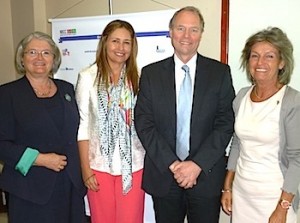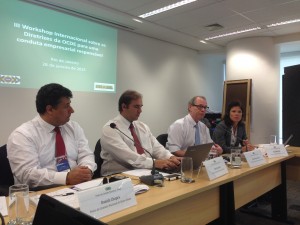Fulldagsseminar med bedrifter, sivilsamfunn, fagforeninger og brasilianske myndigheter ble etterfulgt av fullsatt sal på frokostmøte arrangert av Advokatforeningen i Rio om OECDs retningslinjer for ansvarlig næringsliv. Foruten samarbeid med GK Rio og Amb Brasilia møtte det norske OECD kontaktpunktet også Innovasjon Norge. Norsk næringsliv møter utfordrende konkurranse fra bedrifter som ofte har lavere krav «hjemmefra». Norges OECD kontaktpunkt har i tre år samarbeidet med det brasilianske og britiske nasjonale OECD kontaktpunkt om å heve standarden for ansvarlig næringsliv med felles utgangspunkt i OECDs retningslinjer og FNs veiledende prinsipper for næringsliv og menneskerettigheter.

Det norske kontaktpunktet samarbeider med det brasilianske og britiske kontaktpunkt for å dele erfaringer og bidra til gjensidig kompetanseheving. Møte ble avholdt 26. januar om ansvarlig næringsliv med 48 deltakere fra næringsliv, sivilsamfunn, fagforeninger og akademia der kontaktpunkt fra andre latinske land også deltok. Ulike sektorer fra olje&gass sektoren til tekstilindustrien var representert. Sekretariatsleder Hege Røttingen informerte om det norske kontaktpunktet og hvordan bedrifter kan følge OECDs retningslinjer ved å bygge videre på sitt risiko arbeid i tråd med Due Diligence anbefalingene. Leder for Kontaktpunktet Hans Petter Graver og det britiske kontaktpunktet redegjorde for erfaringer fra saker som kontaktpunktet har meklet. Det brasilianske kontaktpunktet har titalls klagesaker. En klagesak gjaldt en brasiliansk tekstilprodusents ansvar for leverandør i Bangladesh etter brannen i 2012. Ordningen der Arbeidsministeriet støtter det brasilianske kontaktpunktet i mekling i arbeidskonflikter ble presentert.
Den 27.januar arrangerte kontaktpunktet i samarbeid med Generalkonsulatet et møte for norsk-brasiliansk handelskammer i Rio Advokatforening om forholdet mellom rettslige lover og domstoler på den ene siden og OECDs ikke-rettslige retningslinjer for ansvarlig næringsliv på den andre siden. Dilemmaer knyttet til ulike kapitler i OECDs retningslinjer (menneskerettigheter, miljø, korrupsjon) ble drøftet.
(The following text is by Runa Hestmann Tierno for NBCC in Brasil (Norsk-brasiliansk handelskammer)
The seminar was co-hosted by NBCC, the Norwegian Consulate General in Rio de Janeiro, OAB-RJ and the the Commisão de Direito Marítimo Portuário e do Mar (CDMPM) and took place on January 27, 2015 in Rio de Janeiro.
Since 2010, Mr. Hans Petter Graver has been the head of the Norwegian National Contact Point (NCP) for the OECD Guidelines, the most comprehensive set of government-backed recommendations on responsible business conduct in existence today.
Governments adhering to the OECD Guidelines aim to encourage and maximize the positive impact multinational enterprises can make to sustainable development and enduring social progress. The guidelines cover all major areas of business ethics, including information disclosure, human rights, employment and industrial relations, environment, bribery and corruption, consumer interests, science and technology, competition, and taxation.
Mr. Graver is also Dean of the University of Oslo, Department of Private Law, since 2008, and was appointed professor of law in 1993. He is the author of more than 100 publications including books, volumes, and various published academic articles in law, ranging from human rights, ethics, evidence theory, EU-community law, competition law, and public and administrative law. (more here)
“What we experience, is an increasing interest and understanding of the guidelines and why we need them. Companies are seeking information and guidance on what implications these guidelines have on their business and activities“, says Mr. Graver. During the presentation on January 27, he shared experiences and talked about the activities of the Norwegian NCP with the audience. (The OECD NCP presentation is found here)
Joined forces
In 2013, Norway, Brazil and United Kingdom decided to join forces, and today the three countries are working together to promote the OECD Guidelines.
Brazil has been using the annual meetings with the Norwegian and British contact points to spread information and invite representatives from Brazilian industry to take a more active part in the work that is being done. On January 26, an international workshop on the OECD Guidelines took place at BNDES in Rio de Janeiro. Details on the promotion and implementation, mediation on claims and the functioning and procedures of the Brazilian NCP were out lined.
The national contact points are not judicial bodies, but the guidelines are the only government-backed international instrument on responsible business conduct. The NCP shall contribute to resolving conflicts of alleged violations of the OECD Guidelines, and to raise awareness about them.
From the left: Consul general Helle Klem, Lucas Marques from Kincaid and the speaker, Mr. Hans Petter Graver.This year, the NCPs in Brazil, Norway and United Kingdom are focusing on the supply chain. Last year, the finance sector and investors role in responsible business conduct was topic, and first year it was the energy and mining sector.
“It is a priority to us to make sure that the NCPs operate in a similar way and offer the same conditions, no matter where, and this is why we establish cooperation with other countries. This is an opportunity to discuss topics of interest, share experiences and make sure that countries with more resources share and guide countries in the process of building up their local NCP. This is an important forum for information sharing“, Mr. Graver says.
Challenges
NCP does not have any complaints against Norwegian enterprises with business activites in Brazil. The Norwegian NCP has invited 12 major Norwegian companies, some of which are present in Brazil, to take part in a forum for discussions where the aim is to develop internal control systems to make sure that the companies´ operations are in line with the OECD Guidelines.
Corruption is an obvious challenge to international enterprises, and different interpretations of local laws is also known to be creating headaches.
“The interest has been significant, also among Norwegian companies established in Brazil. The challenge is to find a way to handle local challenges, to handle local authorities, that might operate in a different manner than they do back home, operate responsibly in within the frames of a different legal system and a different business culture“, Mr. Graver says.

